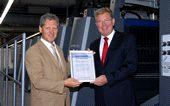Offset Printing
Heidelberg Champions Environmental Protection

Thursday 19. November 2009 - Copenhagen Communiqué on Climate Change signed
Joint initiator of the VDMA guideline on the measurement of energy consumption
Green print production helps to conserve resources and cut costs
The topic of climate protection is high on the global agenda. The climate summit to be held in Copenhagen from December 7 to 18, 2009 aims to secure a new global agreement on climate protection. This new agreement is to be the successor to the Kyoto Protocol, which expires in 2012. The University of Cambridge has released a communiqué ahead of the summit, in which it calls on delegates to agree and support concrete and globally binding measures aimed at protecting the environment. The communiqué states that the rise in global average temperature should be limited to a maximum of two degrees Celsius compared to pre-industrial levels. So far, more than 900 companies have signed up to the initiative, which calls on politicians to take urgent action.
Heidelberger Druckmaschinen AG (Heidelberg) is one of those companies. “We want to show that Heidelberg is fully supportive of the climate protection goals referred to in the communiqué, such as energy efficiency and low-carbon products and services. We will also back up this support with our own measures,” emphasizes Stephan Plenz, Member of the Management Board responsible for Technology and Operations at Heidelberg.
Joint initiator of the VDMA guideline on the measurement of energy consumption
This support is reflected in the role that Heidelberg played in initiating the VDMA guideline on the measurement of energy consumption for sheetfed presses (VDMA: German Engineering Federation). The guideline is to be published as a VDMA standard sheet at the beginning of 2010 and creates an important basis for the objective evaluation of presses in terms of energy consumption and efficiency. Climate balance sheets for print products (carbon footprint) and operating cost assessments also require consistent, industry-standard measurement. Before a print shop can take advantage of subsidies for the purchase of new presses, it must demonstrate that the investment will improve the company’s energy balance. “We welcome the fact that standardized comparative criteria and precise methods of quantification are now available when evaluating energy consumption,” states Stephan Plenz.
Green print production helps to conserve resources and cut costs
“From our point of view and due to the scarcity of resources and rising energy prices, environmental protection is not a passing trend but a development that we have been working on for some time and that will grow in importance in the future,” explains Stephan Plenz.
“Heidelberg is affected in three key areas: At our sites, in the development and production of our products and first and foremost in how we support our customers,” adds Plenz. For over ten years, Heidelberg has exercised a proactive approach to environmental protection throughout its entire value-added chain (e.g. EMAS / ISO 14001 since 1996). At the same time, Heidelberg is also supporting its customers in all aspects of “Green Printing” and is working intensively on the relevant influencing factors. The company’s aim is to reduce or even completely eliminate resource consumption, emissions, and waste. Intensive dialog with users, i.e. print shops, is an important part of this strategy. Reducing paper waste is the best way to leverage optimization and is at the heart of development and consulting.
During drupa 2008, Heidelberg launched the Heidelberg ECO Printing Award in order to give the graphic arts industry a broad platform for the topic of environment and printing. The Heidelberg ECO Printing Award is presented every two years in two categories – sustainable overall print shop concepts and specific stand-alone solutions.
In order to encourage print shops with an active interest in the environment to share know-how and to make ideas that have already been implemented accessible to others, Heidelberg also initiated an “Environmental Dialog” in spring of this year. Furthermore, Heidelberg is also an official cooperation partner for the CO2 calculator of the German Association of Print and Media (bvdm).
Heidelberg recently published its latest sustainability report, which includes successful customer case studies and tips for a green print shop. The report demonstrates that environmental protection is not irreconcilable with business success and can even win new customers. It also lists the twelve steps to a “green print shop”.
